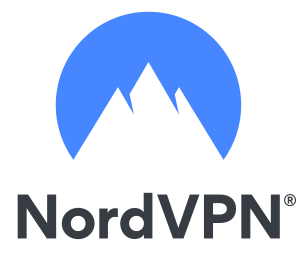Want to get into torrenting but worried about your privacy or getting infected by viruses? You’ve come to the right place. In this post, we’ll cover how to torrent safely without exposing your IP address to potential hackers, avoid viruses, and even dodge the watchful eyes of your ISP or government.
With all the media coverage, it’s easy to think of torrenting as something inherently very dangerous.
But it doesn’t have to be. With the right precautions, it’s simply one of the fastest ways to share and download large files available on the internet.
- Why are torrents dangerous?
- How to stay safe when torrenting
- Download a reputable torrenting client from their official website
- Which VPN is the best choice for torrenting?
Why are torrents dangerous?
First, let’s cover why torrents can be dangerous when approached the wrong way.
Why can torrents be dangerous for a user?
Everyone in the “swarm” can see your real IP address
Torrenting, often referred to as P2P (peer-to-peer) sharing, involves a direct connection with other users rather than downloading data from a dedicated server.
While this method can result in incredibly fast download speeds due to the ability to tap into multiple sources simultaneously, it also exposes you to certain risks.
So, how to torrent safely?
Whenever you download a file through a torrent, you establish a direct connection to other users’ computers. This collective group of connected users is known as a “swarm.”
The crucial point here is that everyone involved in a specific torrent file, whether sharing (seeder) or downloading (leeching), can see each other’s real IP addresses.
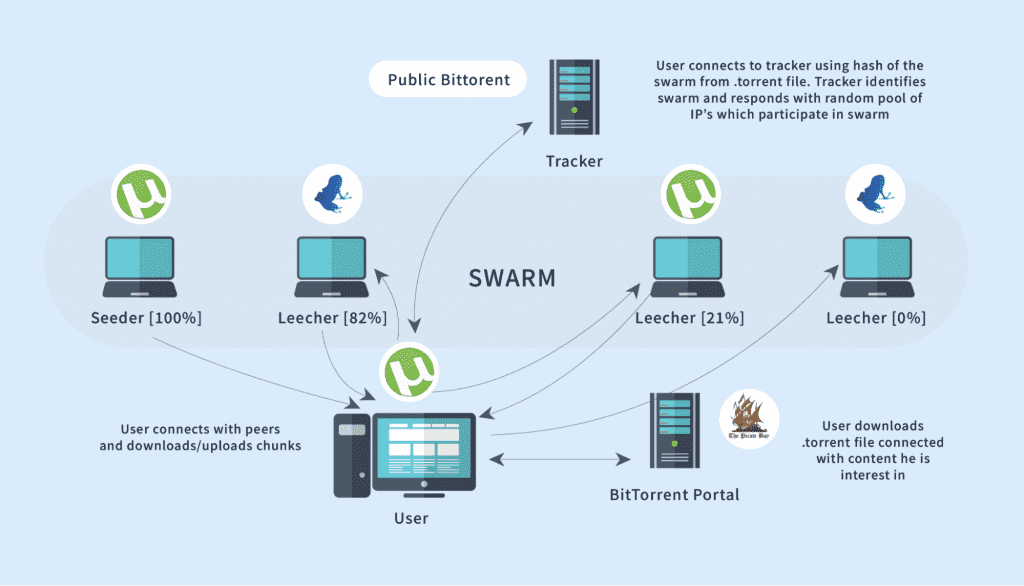

In a worst-case scenario, one of those users could be a hacker, ready to look for weaknesses in your system.
And when one in three Americans have been hacked or had their identities stolen, the last thing you want is to increase your risk of an incident.
But thankfully, there are ways to get around this issue. The best way is to hide your real IP address — we’ll cover how even a non-technical beginner can do this in the next section.
Downloading potentially infected files
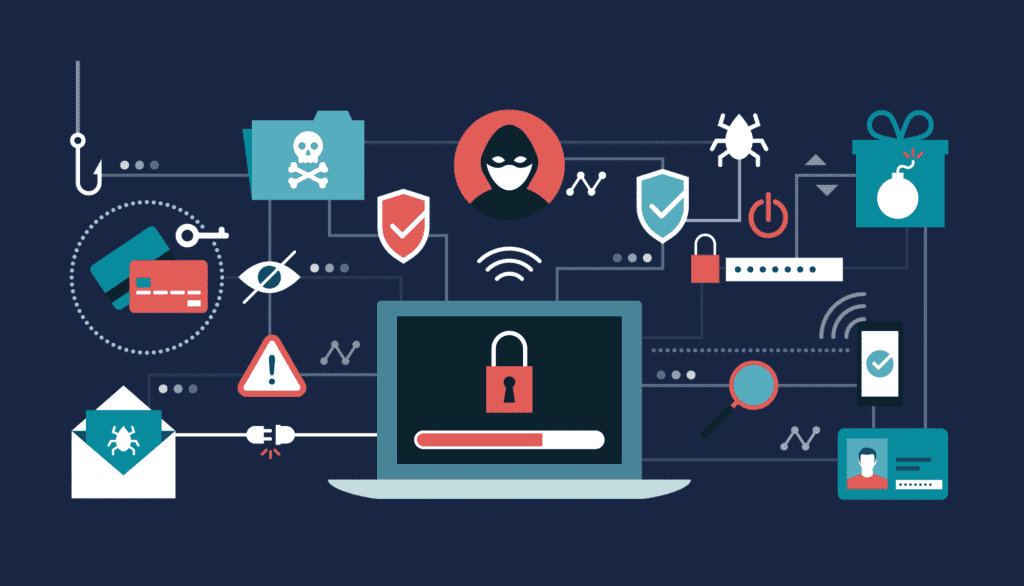

There were over 667 million new malware applications developed and released in 2020 alone. That’s almost two million new pieces of malware every single day.
Torrenting sites are often targets for spreading this malicious software because it’s an easy way to reach a large number of people.
Unless you’re using an official magnet link shared on the actual website of a company or person you follow, you should always take precautions.
You can’t be 100% sure of the files you download, regardless of whether they are executable programs, videos, or music files.
Copyright issues and legal ramifications
Many of the torrent files available online contain copyrighted material, and understanding how to torrent safely is crucial in this context.
While many countries overlook the downloading or streaming of copyrighted content for personal use, when you torrent, you also automatically participate in sharing this content (unless you change the settings in your torrenting client).
However, it’s essential to note that even though you may not face the same severe consequences as the founders of Pirate Bay (one year in prison and millions in fines), it’s a risk you’d likely want to avoid.
One of the significant issues with torrenting is that it’s relatively easy for your ISP (internet service provider) to pinpoint torrenting activity associated with your IP address. In some countries, such as the U.S., legal firms representing copyright owners can subpoena the IP addresses of known downloaders.
The problem is compounded by the fact that IP addresses are visible to everyone, including external trackers.
Once someone has your IP address, they can immediately determine your location and your ISP. To find your identity, all they have to do is contact the ISP or ask the court to order the ISP to disclose your identity.
The best course of action is to be cautious and avoid downloading copyrighted material. However, accidents can happen. In such cases, using an anonymous IP address becomes a crucial safeguard, protecting you from potential legal ramifications while you learn how to torrent safely.
ISP throttling
Many ISPs throttle the download speed of users they can see torrenting files. What that means is that they basically turn down the internet speed for the torrenting traffic.
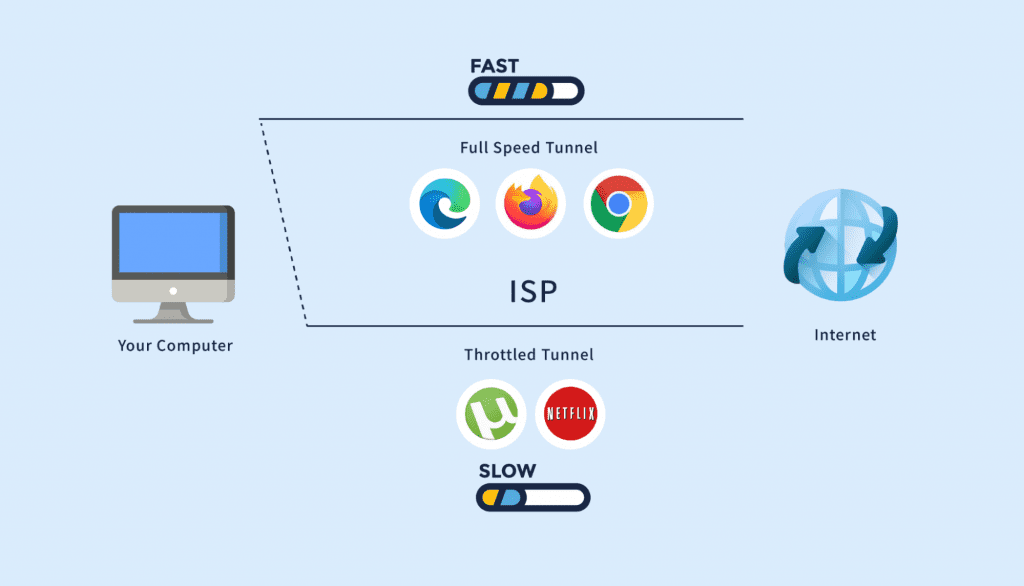

In some cases, it may even affect all the traffic going to and from your router. If you’re experiencing excruciatingly slow traffic after downloading a torrent, this may be the reason.
Again, the reason the ISP can even know to throttle the traffic is because it can see that you’re connecting directly to a swarm of different IP addresses.
Thankfully, there’s a way around that (more on this later). Now that you understand the potential dangers of torrenting let’s cover how you can stay safe from these dangers in 2023.
Tips on how to torrent safely
In this section, we share some tips on how to torrent safely in 2023. It all starts with downloading the right torrent client.
Get a trusted torrent client from their official site
Don’t trust links from random third-party websites when you’re downloading and installing software on your computer.
That’s especially true when downloading something in somewhat of a gray area, like a torrenting client.
The best way to stay safe is to Google the client name, visit the official website, and download the client from there. Make sure you uncheck any unwanted bundleware that the installer may ask to include.
For example, you could install any of the following clients:
- uTorrent
- qBittorrent
- Bittorrent
- Vuze
- Deluge
This isn’t the software category to experiment with, so sticking to the options you already know is probably the best choice.
uTorrent is one of the most popular options on the market and offers a few different free options.
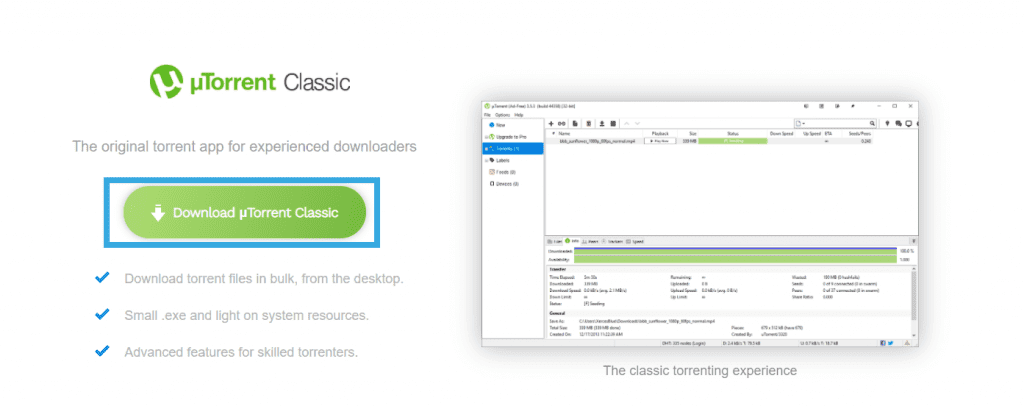

Carefully choose the torrents you download
Of course, the risk doesn’t end if you install a well-known torrent client. That’s only the first step in learning how to torrent safely.
Every time you download a torrent file, you’re at risk of infecting your system.
To torrent safely, you should only use magnet links from reputable torrent websites and exercise caution to avoid accidentally downloading copyrighted material.
Despite the tumultuous past of the original Pirate Bay founders, someone is still running the site on offshore servers, and it’s still the most popular torrent site to this day.
If your country’s laws don’t allow the downloading of copyrighted material for personal use, you should also carefully avoid downloading torrent files of movies, games, or other copyrighted content.
Furthermore, note that your ISP may block you from even visiting sites like the Pirate Bay, even if your intent is to download files in the free domain.
Use a VPN to hide your IP address
In our previous section on why torrents can be dangerous, you may have noticed a recurring theme — one of the reasons torrenting is dangerous is because your real IP address is there to be seen.
Not just by other users and potential hackers, but by your ISP, and by extension the government and sue-happy copyright lawyers.
But the thing is, you don’t have to let people see your real IP address when torrenting. You can hide it with a VPN (virtual private network) to stay safe.
In simple terms, a VPN acts as a middleman between you, the ISP, and other users. By encrypting your traffic, it hides your activities from the ISP and hides your real IP address from the other torrent users.
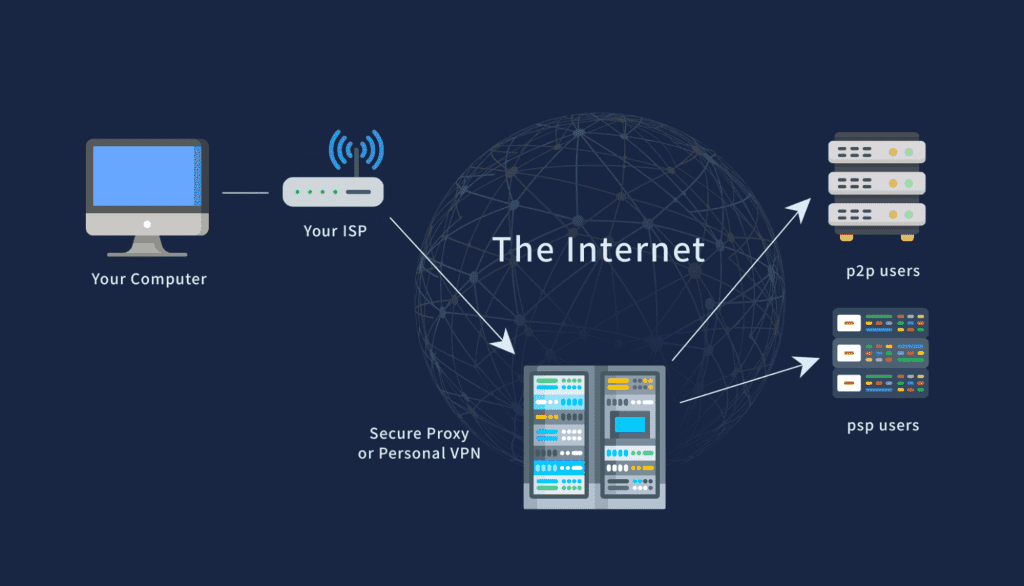

A VPN actually diminishes or completely removes many of the biggest risks of torrenting, including:
- A potential hacker could make you a target because they see your IP address.
- A copyright owner might find out your identity because the IP address was easily visible.
- Your ISP may throttle your traffic because it sees that you’re connecting to a torrent swarm.
You can set up a VPN as a proxy manually within the torrent client itself, but it’s usually much easier to simply sign up for a VPN service and install the app directly.
Is Torrenting safe with a VPN?
Using a VPN hides your IP address and protects your privacy when torrenting, hiding your activity from your ISP, and, by extension, the government and copyright lawyers.
But you still have to be careful when downloading torrent files, especially executable programs.
If you’re unlucky, your computer could get infected with a virus, backdoor, or some other kind of malware.
And that brings us to the final step of the process of torrenting safely — actually scanning all of your downloaded files.
Scan every file you download
Even if you took every precaution before downloading, you need to scan the file after it’s done.
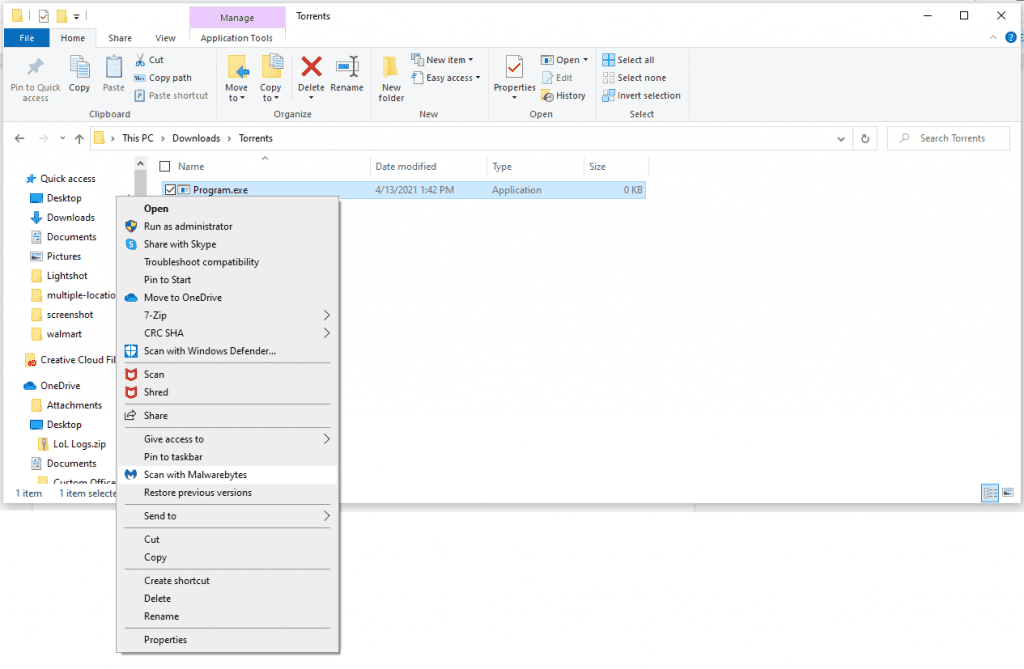

Most modern web browsers automatically scan any files you download. Major torrent clients are the same. But they don’t have access to the same backlog of potential virus markers as dedicated antivirus or antimalware software.
So the best choice is to scan every single file you download using torrents.
Which VPN is the best choice for torrenting?
While a VPN is a prerequisite for safe torrenting, not all VPNs are created equal. First of all, some don’t even allow any P2P sharing at all on their servers.
If you try to download a torrent, it will simply kick you off the network. Of course, if you can’t use the VPN, you’ll be forced to torrent using your real IP address, leading to the exact same risks as before.
So to help you avoid that issue, we’ve scoured the industry and selected few that stand out when it comes to torrenting:
These companies vocally support peer-to-peer sharing (maybe with some comments about avoiding copyrighted material). Plus, we’ve been able to confirm multiple user reports of successfully using the VPN to torrent files.
Here are just a few of their key torrent-friendly features.
| Features | ExpressVPN | NordVPN | Surfshark |
| Allows P2P/Torrenting: | ✓ | ✓ | ✓ |
| End-to-end Encryption | ✓ | ✓ | ✓ |
| Keeps No Traffic Logs | ✓ | ✓ | ✓ |
| Reliable Connection | ✓ | ✓ | ✓ |
| Fast Download/Upload Speeds | ✓ | ✓ | ✓ |
You may be tempted to look for a free VPN. But keep in mind that many often limit download volume to 500 megabytes per month, and servers can be incredibly unreliable.
If you’re planning to download more than a single file, choosing a reliable paid VPN is the best option.
No logging policy is a must
A “no log” or “no logging” policy basically means that the VPN company vows to not track and store any of your internet activity.
All of the three companies listed above are very vocal about privacy and don’t record anything you do. You can privately browse the internet or download torrents in peace.
But among them, ExpressVPN stands out. Registered in the British Virgin Isles, ExpressVPN is subject to strict privacy laws and is totally free from government pressure to track your every move.
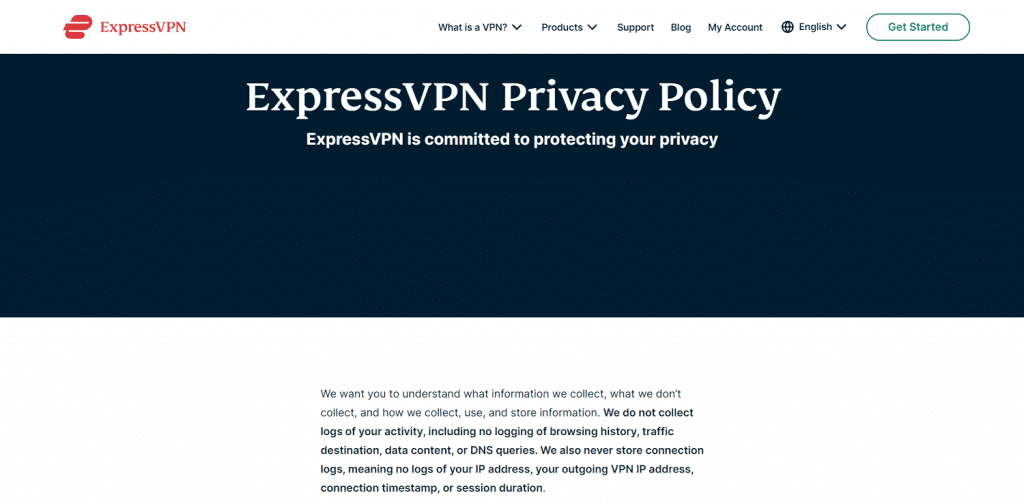

The company’s policy states that they keep no records of: browsing history, traffic destination, data content, or DNS queries.
ExpressVPN also doesn’t keep any connection logs, meaning no logs of your IP address, your outgoing VPN IP address, connection timestamp, or session duration.
Reliable end-to-end encryption
To stay anonymous as a torrent user and hide activity from your ISP, you need reliable encryption.
All of the providers on our list use AES-256-bit encryption to protect your internet traffic from prying eyes. That basically means everything you do is protected by a password that’s virtually uncrackable.
Company-owned DNS
Another reason these three options stand out, is that they directly own the DNS (domain name system) servers.
A DNS is a part of what gives you an identifiable IP address when you’re connected to the internet.
Your ISP assigns you one as part of your internet service. Obviously, if the VPN company just rents DNS servers, that third party may keep unwanted logs of your activity without your knowledge.
But all of the VPN alternatives we recommend own the DNS servers, which protects your privacy.
Speed: Why ExpressVPN is the best option
The last factor, and maybe the most important one, is speed. If you use a VPN and it drastically slows down your torrent downloads, it will ruin the experience.
The main reason to torrent is that it’s so fast. You need a VPN provider that can match that speed.
ExpressVPN can do exactly that. In our latest performance test, we maintained over 90% of our download speed after connecting to its servers.


With ExpressVPN, you get a 100% private, reliable, secure, and (perhaps most importantly) fast torrenting experience.
It’s a great choice for anyone who wants to avoid prying eyes and torrent their files in peace.
If you want to learn more about ExpressVPN before you make your decision, check out our in-depth ExpressVPN and torrenting post.
Conclusion
In conclusion, understanding how to torrent safely is crucial because when done wrong, torrenting can expose you to various risks, including lawsuits and hacker attacks.
To ensure your peace of mind while torrenting privately and securely, investing in a VPN is the right choice. With ExpressVPN‘s iron-clad 30-day-money-back guarantee, you can even try it out without any risk.
For more details about our recommended VPN services, be sure to check out our comprehensive reviews, including the ExpressVPN review, NordVPN review, and Surfshark review. Stay safe and enjoy your torrenting experience with the right precautions in place.




